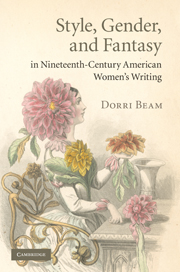Book contents
- Frontmatter
- Contents
- Acknowledgements
- Introduction. Highly wrought style
- 1 Florid fantasies: Fuller, Stephens, and the “other” language of flowers
- 2 Sensing the soul: mesmerism, feminism, and highly wrought fiction
- 3 Harriet Prescott Spofford's philosophy of composition
- 4 Pauline Hopkins' baroque folds: the styled form of Winona
- Coda: The value of ornament: Gilman and Wharton
- Notes
- Bibliography
- Index
1 - Florid fantasies: Fuller, Stephens, and the “other” language of flowers
Published online by Cambridge University Press: 05 October 2010
- Frontmatter
- Contents
- Acknowledgements
- Introduction. Highly wrought style
- 1 Florid fantasies: Fuller, Stephens, and the “other” language of flowers
- 2 Sensing the soul: mesmerism, feminism, and highly wrought fiction
- 3 Harriet Prescott Spofford's philosophy of composition
- 4 Pauline Hopkins' baroque folds: the styled form of Winona
- Coda: The value of ornament: Gilman and Wharton
- Notes
- Bibliography
- Index
Summary
In a semiautobiographical sketch in her travel memoir, Summer on the Lakes, Margaret Fuller compared the words of her fictional heroine, Mariana, to a “fire of cinnamon.” As such, Mariana's expression is too intense to bear: “What she wanted to tell they did not wish to hear; a little had pleased, so much overpowered, and they preferred the free air of the street, even, to the cinnamon perfume of her palace” (61). Forced to quell her intensity, Mariana languishes and dies. One familiar with the recovered canon of nineteenth-century American women writers might wonder at the linguistic threat of Fuller's heroine and the erotic cadence – the cinnamon perfume – of Fuller's own words. The cloistered decadence evoked is not that of Fuller's earnest political voice, nor is Mariana's lonely demise quite like the sentimental deaths of the period that bind and affirm social values. Yet Fuller's is not the only perfumed palace of the nineteenth century. It was not uncommon for nineteenth-century women to assign a fragrance to their feelings as Fuller did, and in fact this was the business of flower language, popular throughout the nineteenth century.
This chapter explores the intensity of expression, and floridity of language, in Fuller's and other women's writing of the mid-nineteenth century by returning to the popular discourse on flower language which their writing signals, reinterprets, and extends into alternative expressive forms.
- Type
- Chapter
- Information
- Publisher: Cambridge University PressPrint publication year: 2010

